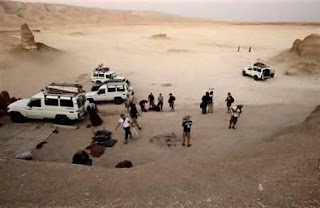Despite Egypt's ancient allure, today the country probably attracts more beach vacationers than any other type of tourists. This is because, for many Europeans, the warm Egyptian beaches are both inexpensive and well appointed. Many European countries lack warm beaches and the alternatives to Egypt are somewhat expensive. Therefore, not only do people come to Egypt's beaches independently, but many arrive by way of chartered airlines that specialize in such vacations from Europe. Depending on how one looks at it, Egypt can be said to have as many as seven beach zones. These consist of the Mediterranean beaches along the mainline coast from the Suez Canal over to Libya, the Mediterranean beaches along the northern Sinai, the Sinai coast along the Gulf of Aqaba, the Sinai coast along the Gulf of Suez, the southern Sinai region which opens onto the Red Sea, the Mainland coast along the Gulf of Suez and the Mainland coast south of that along the Red Sea. Each of these areas either vary somewhat, or extensively from the others. Obviously the biggest differences are between the Mediterranean coast and all of the other regions that connect with the Red Sea. Some of these regions attract extensive tourism, while others are almost void of tourists. Some attract very specific tourists, while others are more generalized.
The North Coast from Libya, East through to Sinai
In reality, the various regions are looked upon somewhat differently. For example, on the Egyptian mainland coast along the Mediterranean, there is a vast difference between the area from Alexandria over to Port Said from the region west of Alexandria. East of Alexandria is very populous along much of the Delta and not suitable for beaches until one reaches the northern Sinai. The beaches at Alexandria cater almost exclusively to Egyptians, with the exception of some specific resorts, who either have their own villas or apartments, or who stay in hotel facilities. In fact, probably most Egyptians come to Alexandria not for a beach vacation as such, but to escape the heat of Cairo.
West of Alexandria along the coast, thinning out as one proceeds further west, but extending almost to the Libyan border, are resorts that differ from the beach hotels and facilities to the east. These are frequently compounds, as opposed to real villages, some of which are very exclusive and have only recently been built. The main point is that, while indeed some foreign tourists can be found in this region, they are very few in number, other than tourists visiting Alexandria for more classical reasons. This, of course, may change over time.
The region west of Alexandria has been called "underdeveloped". That too is rapidly changing, as new resorts are popping up all along the shoreline, particularly just west of Alexandria. One of the intriguing aspects of the Mediterranean coast beach resorts is that there is a certain amount of experimentation with various types of beaches. For example, around Marina, one of Egypt's most exclusive northern beach resort areas, specific beaches have been set aside for women, who wish to enjoy the beach without interference from male eyes, and youth, where the atmosphere is a little more lively and geared to their pleasures.
12:27 PM | 0
comments | قراءة المزيد







